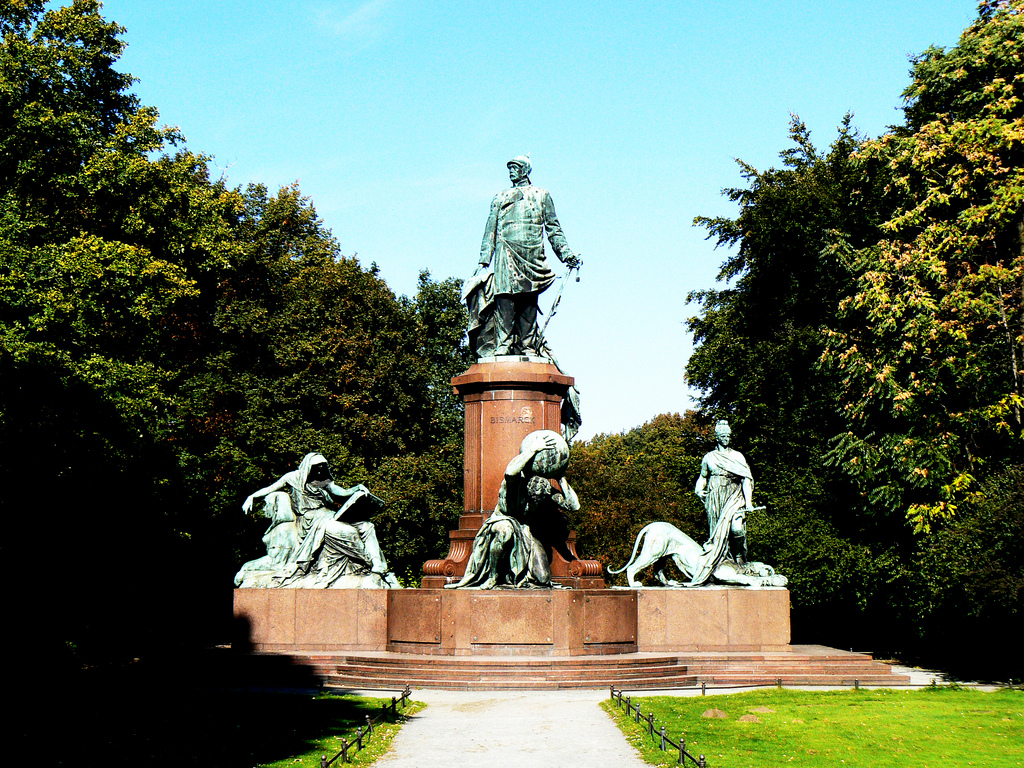
Born in Prussia on April 1, 1815, Otto von Bismarck went on to become the first chancellor of Germany and the mastermind behind its unification. Known for his ruthless but brilliant politics, Bismarck was lionized almost instantly upon his death, but his role in European history has undergone critical reassessment since the reunification of Germany 20 years ago. Below, in Bismarck: The Iron Chancellor, Volker Ullrich explores the myths and realities surrounding Bismarck’s legacy.
Many people felt that Bismarck’s death marked the end of an epoch. After 1898, Bismarck monuments sprang out of the ground like mushrooms. They showed the founder of the Reich as a statesman in uniform, complete with pickelhaube, jackboots and saber – a knight in armor, a sort of King Arthur of the Reich, gazing into the far distance with a grim expression.
The Bismarck myth rapidly lost touch with the real historical figure. Behind the monumental image of the ‘Iron Chancellor’, the defining characteristic of his foreign policy since the mid-1870s was lost from view – namely Bismarck’s sense for moderation and restraint arising form the insight that the German Reich could only be preserved if it defined itself as ‘saturated.’ Time and again he warned that the first priority was to secure “what we have laboriously achieved under threat of armed attack by the rest of Europe.” It was a message that even towards the end of his rule was heeded less and less… The young generation, anxious to follow the seductive call for ‘world politics’, felt that his policy of pursuing balance in order to assure the peace was out of date.
Bismarck became, after his death, the figurehead of an overheated nationalism into whom vague imperialistic longings could be projected. In the process, one of his key maxims was forgotten: that politics should always remain the ‘art of the possible’, or as he sometimes also expressed it, ‘a science of the possible’. In everything that Bismarck planned and carried out as a politician, he had adapted seamlessly to prevailing situations, calculating how best to take advantage of them to achieve his ends. He had a greater influence than any other man on the fate of Germany and Europe in 19th century, yet he was always conscious of the limits to his political actions. ‘One thing you learn thoroughly in this business is that you can be as clever as anyone in this world, and still at any moment you may find yourself walking in the dark like a child,’ he wrote. This was not false modesty – Bismarck never suffered from a lack of self-confidence – but an expression of his deep-seated skepticism when it came to the very notion of planning and making history. ‘One cannot oneself create anything; one can only wait till one hears the footsteps of God resounding through events; then leap forward and seize hold of the hem of his coat – that is all.’
And it was a great deal! The ability to wait for the decisive instant, taking advantage of a uniquely favorable moment with determination – this was a skill Bismarck brought to the point of perfection. That is why he was once described, not without reason, as a ‘genius of the present’.
It is one of the striking contradictions that characterize Bismarck’s life’s work and make him such a fascinating politician that though he did so much to shape his times, he was filled with a lasting feeling of impotence against the great forces by which history is shaped. ‘ For a man cannot create and direct the current of time,’ he lectured even after his fall, ‘he can only travel down it and steer, with more or less experience and skill; he may be shipwrecked, or run aground, or he may come into safe harbors.’
Excerpted by Jodie C. Liu
*Photo courtesy izaeus | argazkiak.




Send A Letter To the Editors